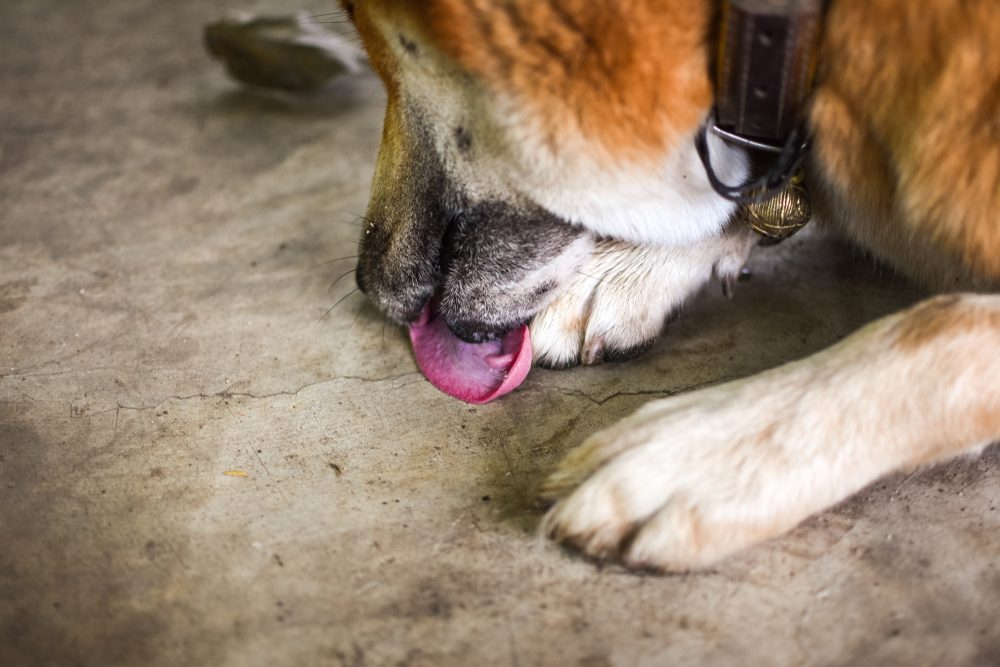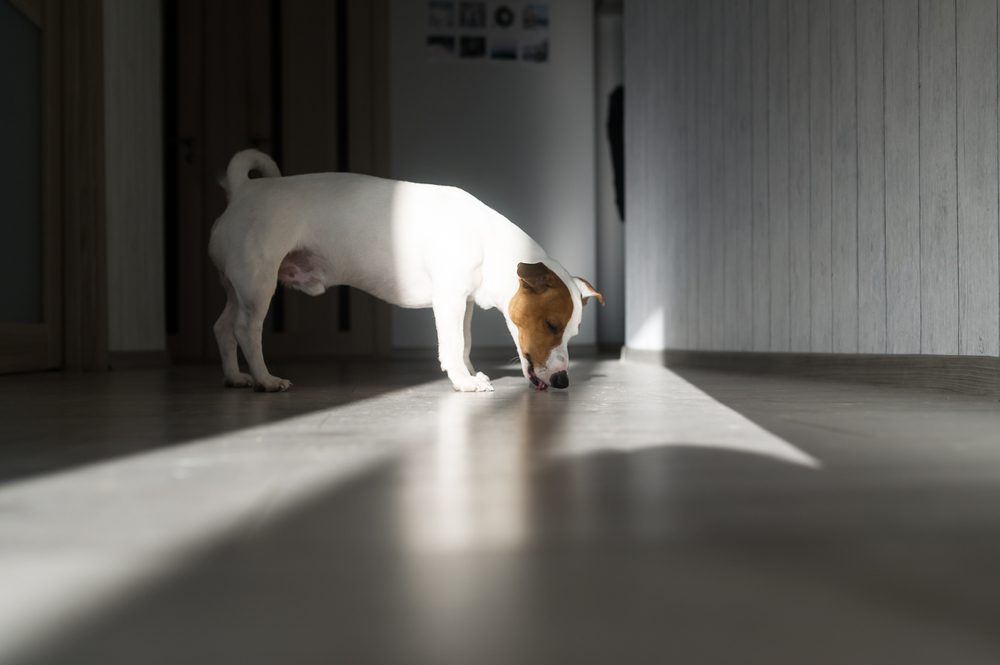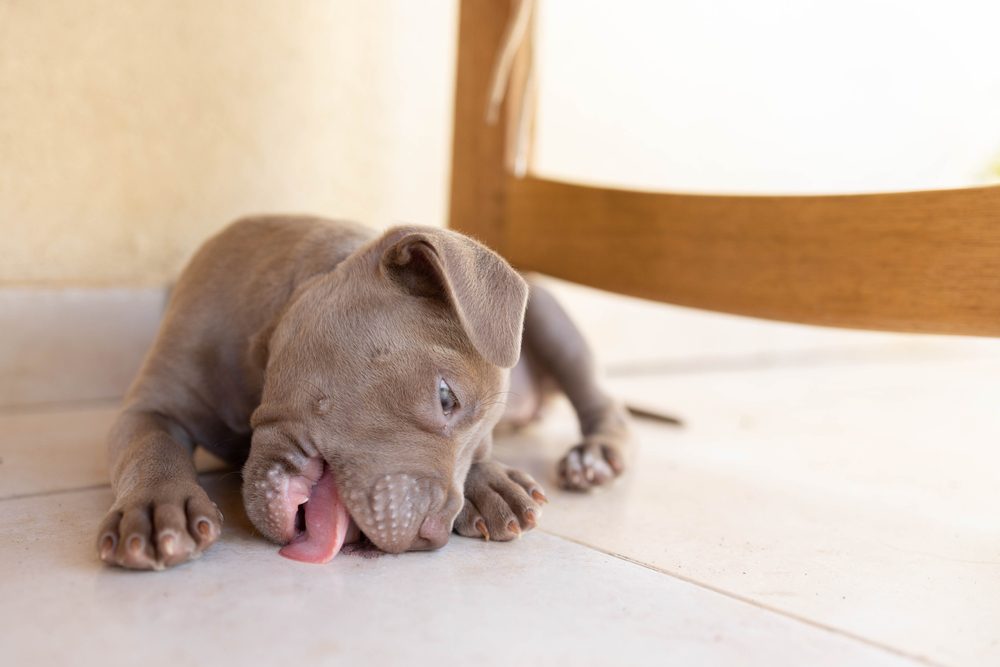We have a lot in common with our four-legged family members. We have most of the same organs, and we even process information in a similar way. Our dogs have it easy: we feed them, play with them, and clean up after them. But we have a major advantage that dogs don’t have: hands. Because they lack hands, dogs interact with the world around them using their mouths. Our pups give us sloppy kisses to show affection, they lick themselves to clean up, and they sometimes even give their toys a tongue bath. Unfortunately, sometimes dogs end up licking things they shouldn’t. Have you ever wondered, “Why is my dog licking the floor?” You’re in luck! We’re here to decode this mystifying (and nasty) behavior.

Why do dogs lick the floor?
Some dogs will lick almost anything, and while we don’t fully understand how they could possibly enjoy licking the floor, this seemingly unusual behavior makes perfect sense to your pup. Dogs can’t express themselves using words, so they have to find other ways of communicating with us. Unless you’ve recently spilled something tasty on the floor, your dog is trying to tell you something. So, why is your dog licking the floor? According to the Dharamsala Animal Rescue, “There are several reasons – some are relatively harmless; others could be a cause for concern.” Here are a few potential reasons your pup licks the floor.
#1: He has anxiety
Obsessive behaviors, such as repeatedly licking the floor – or even his own fur – could indicate that your pup is suffering from anxiety. A recent move, a change in the number of people living in your home, or even redecorating may lead your dog to feel anxious.
#2: He isn’t feeling well
Licking any surface causes an increase in saliva production, providing a buffer against stomach acid buildup. If your pup suddenly begins licking the floor, he could be trying to tell you that he feels ill. When accompanied by additional symptoms, such as lethargy, gastrointestinal problems, or changes in mood, floor licking means you should take your pooch to see the vet.
#3: He’s bored
When dogs don’t receive adequate physical and mental stimulation, they sometimes turn to unusual or destructive behaviors to keep themselves entertained. Make sure your pup gets plenty of exercise, and provide him with toys like feeder balls to ensure he’s being mentally stimulated when you’re not available for playtime.

How do I stop the dog from licking the floor?
If your dog licks the floor because spills are a common occurrence in your home, the simplest way of putting a stop to his behavior is cleaning up after you eat. On the other hand, some pups lick the floor for other reasons. Take your dog to the vet if you’re concerned he’s ill or suffering from anxiety. However, if your dog continues licking the floor out of boredom, try a natural deterrent like Garrick’s Bitter Apple, a pet-safe spray that tastes foul to dogs but won’t make them ill. We also recommend distracting your dog with a toy or puzzle feeder as a more attractive alternative to the kitchen floor.
Why do dogs lick the floor when they’re sick?
Some dogs have what vets refer to as Excessive Licking Syndrome, or ELS. According to research, 73 percent of dogs suffering from ELS were later diagnosed with a range of gastrointestinal problems like Irritable Bowel Syndrome (IBS), giardia, and pancreatitis. In addition to the protection that excess saliva provides your pup, it’s also possible that triggering an increase in saliva production makes it easier for your pup to vomit. Pain and illness can also spark anxiety in dogs. If your pup has never displayed compulsive behaviors like pacing or licking the floor, it’s always a good idea to take him in for a checkup.
Why do dogs lick the furniture?
Dogs with ELS will lick anything they can get their mouths on – toys, your shoes, the walls, and even furniture. If your pup is suffering from separation anxiety, he may be especially drawn to furniture because it smells like you. Speak with your vet about ways to help your dog overcome his anxiety. Your vet may recommend behavioral modification therapy or even prescribe medication that can alleviate your pup’s symptoms.

Whether your dog has recently started licking everything in sight, or he’s been licking the floor since he was a puppy, floor-licking is a frustrating behavior for pet parents. Because most dogs who compulsively lick the floor suffer from anxiety or a physical condition, we recommend a vet visit just to be on the safe side.



